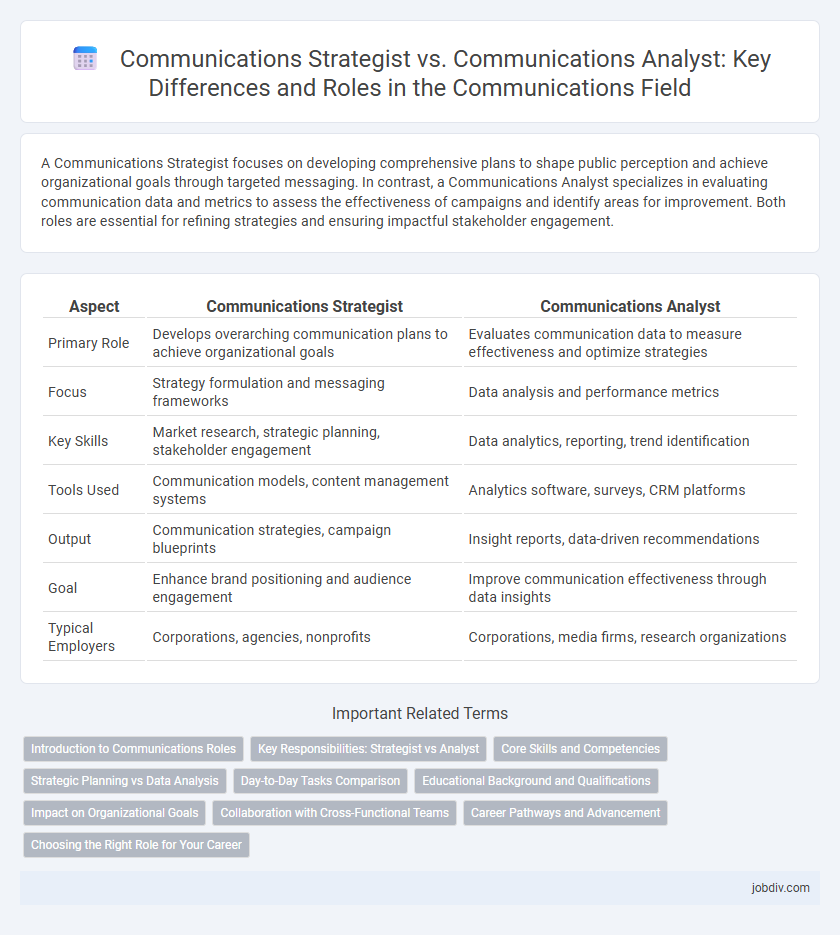A Communications Strategist focuses on developing comprehensive plans to shape public perception and achieve organizational goals through targeted messaging. In contrast, a Communications Analyst specializes in evaluating communication data and metrics to assess the effectiveness of campaigns and identify areas for improvement. Both roles are essential for refining strategies and ensuring impactful stakeholder engagement.
Table of Comparison
| Aspect | Communications Strategist | Communications Analyst |
|---|---|---|
| Primary Role | Develops overarching communication plans to achieve organizational goals | Evaluates communication data to measure effectiveness and optimize strategies |
| Focus | Strategy formulation and messaging frameworks | Data analysis and performance metrics |
| Key Skills | Market research, strategic planning, stakeholder engagement | Data analytics, reporting, trend identification |
| Tools Used | Communication models, content management systems | Analytics software, surveys, CRM platforms |
| Output | Communication strategies, campaign blueprints | Insight reports, data-driven recommendations |
| Goal | Enhance brand positioning and audience engagement | Improve communication effectiveness through data insights |
| Typical Employers | Corporations, agencies, nonprofits | Corporations, media firms, research organizations |
Introduction to Communications Roles
Communications Strategists develop comprehensive plans to shape brand messaging and target audiences, leveraging market research and creative tactics to enhance organizational reputation. Communications Analysts focus on data-driven evaluation of communication campaigns, measuring effectiveness through analytics, feedback, and media monitoring to inform strategic adjustments. Understanding the distinct roles and skill sets of Strategists and Analysts is crucial for optimizing communication outcomes within businesses and nonprofits.
Key Responsibilities: Strategist vs Analyst
Communications Strategists develop comprehensive plans to align messaging with organizational goals, focusing on audience segmentation, campaign design, and brand positioning. Communications Analysts evaluate data from communications initiatives, measuring effectiveness through metrics like engagement rates, media impact, and sentiment analysis. Strategists drive creative direction and decision-making, while analysts provide actionable insights based on quantitative and qualitative data to optimize communication tactics.
Core Skills and Competencies
Communications Strategists excel in crafting targeted messaging frameworks, leveraging market research and audience segmentation to shape brand perception and drive engagement. Communications Analysts specialize in data interpretation, monitoring communication campaign metrics, and providing actionable insights to optimize effectiveness and ROI. Core competencies for strategists include strategic thinking, content development, and stakeholder alignment, whereas analysts emphasize analytical skills, proficiency in communication analytics tools, and trend analysis.
Strategic Planning vs Data Analysis
Communications Strategists excel in strategic planning by developing comprehensive messaging frameworks to align with organizational goals and target audience engagement. In contrast, Communications Analysts concentrate on data analysis, interpreting communication metrics and audience behaviors to optimize campaign performance. Both roles leverage distinct methodologies to enhance the effectiveness of communication initiatives, blending strategic foresight with empirical insights.
Day-to-Day Tasks Comparison
Communications strategists develop and implement comprehensive communication plans, coordinating messaging across multiple channels to align with organizational goals. Communications analysts focus on data collection, evaluating the effectiveness of communication efforts through metrics, surveys, and feedback analysis. Both roles require collaboration with marketing and public relations teams, but strategists prioritize creative campaign development while analysts emphasize performance measurement and optimization.
Educational Background and Qualifications
Communications Strategists typically hold advanced degrees in communications, marketing, or public relations, emphasizing strategic planning, brand management, and leadership skills. Communications Analysts often possess degrees in communications, data analytics, or social sciences, focusing on data interpretation, media metrics, and performance evaluation. Professional certifications such as Certified Communications Professional (CCP) benefit Strategists, while Analysts gain credentials in data analysis and media measurement tools.
Impact on Organizational Goals
A Communications Strategist drives organizational goals by crafting targeted messaging that aligns with long-term business objectives, enhancing brand perception and stakeholder engagement. A Communications Analyst supports this impact by leveraging data analytics to measure campaign effectiveness and identify trends, enabling data-driven adjustments to communication plans. Both roles contribute to achieving organizational goals, with strategists focusing on creative direction and analysts prioritizing performance insights.
Collaboration with Cross-Functional Teams
Communications Strategists develop overarching messaging frameworks that align with brand vision, fostering seamless collaboration across marketing, sales, and product development departments. Communications Analysts utilize data-driven insights to evaluate messaging effectiveness and inform adjustments, ensuring all teams maintain consistent narrative coherence. Both roles drive cross-functional synergy by integrating strategic planning with analytical evaluation to optimize communication outcomes.
Career Pathways and Advancement
Communications Strategists focus on designing and implementing comprehensive communication plans to enhance brand visibility and stakeholder engagement, often advancing into leadership roles such as Communications Director or Chief Communications Officer. Communications Analysts specialize in data-driven evaluation of communication campaigns, utilizing analytics tools to measure effectiveness, with career progression typically leading to senior analyst or insights manager positions. Both pathways offer opportunities for cross-functional growth, but strategists tend to move towards creative leadership, while analysts deepen expertise in metrics and performance optimization.
Choosing the Right Role for Your Career
A Communications Strategist develops comprehensive plans to enhance brand messaging and target audience engagement, leveraging market trends and competitive analysis. In contrast, a Communications Analyst focuses on data-driven evaluation of communication campaigns, using metrics and analytics to measure effectiveness and optimize strategies. Selecting the right role depends on whether you prefer creative planning and leadership (Strategist) or data analysis and performance measurement (Analyst) within the communications field.
Communications Strategist vs Communications Analyst Infographic

 jobdiv.com
jobdiv.com